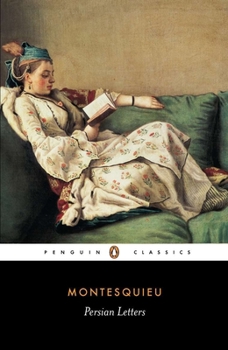The Persian Letters
Select Format
Select Condition 
Book Overview
This richly evocative novel-in-letters tells the story of two Persian noblemen who have left their country - the modern Iran - to journey to Europe in search of wisdom. As they travel, they write home to wives and eunuchs in the harem and to friends in France and elsewhere. Their colourful observations on the culture differences between West and East culture conjure up Eastern sensuality, repression and cruelty in contrast to the freer, more civilized...
Format:Paperback
Language:English
ISBN:0140442812
ISBN13:9780140442816
Release Date:April 1973
Publisher:Penguin Group
Length:352 Pages
Weight:0.45 lbs.
Dimensions:0.8" x 5.0" x 7.8"
Age Range:18 years and up
Grade Range:Postsecondary and higher
Customer Reviews
5 ratings
Great service...
Published by Thriftbooks.com User , 17 years ago
Arrived on time and in impeccable condition. Great to work with them.
Iran
Published by Thriftbooks.com User , 18 years ago
This book is well written. This book illustrates how Persian Letters contributes to the Enlightment Movement in Europe. Last, when Uzbek left home and his harem fall apart. Perhaps, the book was making a point that European society was falling apart.
Philosophy in the guise of fiction
Published by Thriftbooks.com User , 19 years ago
This was one of the books I read in my History of the Enlightenment Class my junior year of college. Our brilliant professor didn't assign all of the letters to read, though, and later I went back and read all of the book, not just the ones we'd been assigned to read for class. A lot of books about the politics and philosophy of a certain period in time don't age well, but this one, for the most part anyway, sounds just as fresh and entertaining today as it did in the eighteenth century. And using the pretence of this being a collection of real letters he intercepted from some Persian houseguests, Montesquieu was able to communicate the new exciting beliefs of his age by having them be told through the so-called eyes of Usbek, Rica, and Ibben, who were experiencing this all for the very first time and having to get adjusted to a real clash of values. This also worked to his advantage in a few cases, like where Usbek is talking about how there is a magician even greater than the King of France, saying "This magician is called the Pope" and going into a whole scathing litany about the Pope. He was able to attack the King and the Church by pretending that foreign travellers were writing and believing these things.The subplot is very interesting too. While Usbek and his friend Rica are away in France for seven years soaking up the Enlightenment, Usbek's wives, concubines, and slaves are getting more and more restless. While the cat's away, the mice will play, and the guiltiest party is the one the reader least suspects. This brings up the Enlightenment question about personal freedom, and how someone might react in such a situation. These women, and these male slaves, have never questioned their total subservience to Usbek until it becomes clear he's not going to be back for quite some time. They give in to their natural human instincts, wanting greater personal freedom and realising they don't have to be these obedient little automatons with no personal wishes or desires of their own apart from absolutely pleasing Usbek in all things. And by the time Usbek gets wind of this from his faithful eunuchs, the women and the slaves have already tasted freedom and will not go back to how things used to be without a fight. (Though I was surprised that the eunuchs never got into this rebellion against the restrictive rules too, and wondered where Zephis and Fatme, two of the other five main wives, went, since they aren't mentioned in the Chief Eunuch's first letter to Usbek telling him of the "horrible sins" which his women and slaves have been engaging in without him around.)This book is great not only as history, but also as fiction and philosophical, political, and religious commentary, ringing as true today in many respects as it did nearly three hundred years ago.
Magnifique critique du XVIIIe siècle français.
Published by Thriftbooks.com User , 21 years ago
La société française critiquée par Montesquieu par l'intermédiaire de deux persans en voyage à Paris, qui s'étonnent de ce qu'ils y voient dans des lettres qu'ils envoient à leurs amis et femmes... Habile manière pour critiquer son siècle sans être ennuyé par la politique du Roi... Montesquieu brosse un tableau amusant et satirique du XVIIIe siècle, entrecoupé de lettres des femmes des persans ou des eunuques chargés de les garder pour le moins désopilentes.
Persian Letters
Published by Thriftbooks.com User , 21 years ago
Persian Letters (Lettres Persanes) was first published in 1721 when Montesquieu was 32 years old. The book is about three Persians: Usbek, Rica, and Rhedi, who set out for Europe to study it's manners and institutions. Rhedi stops at Venice, while Usbek and Rica continue on to Paris. Very soon after their departure, there begins a brisk exchange of letters between the Persian visitors, and their wives, servants, and friends at home, as well as between the visitors themselves.One visitor, Usbek, a Persian lord, must keep in close contact with his harem of wives in his seraglio, as well as the eunuchs who guard the wives. When disorders break out in the seraglio, the eunuchs try to restore discipline by administering to two of the wives, "that chastisement which begins by shocking one's modesty, involving the deepest humiliation and takes one back to the time of her childhood." Montesquieu however, uses this framework to comment on a very wide amount of subjects. The book also attacks errors and vices that will last as long as humanity. It is sometimes witty, sometimes profound.




